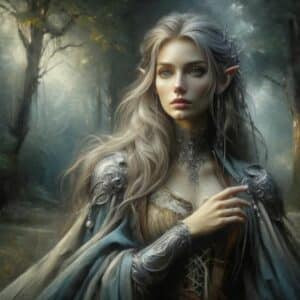In recent years, the intersection of artificial intelligence (AI) and creative domains has sparked an exciting wave of innovation. One such fascinating development is the concept of “fantasy AI.” This unique blend of fantasy and advanced technology is reshaping how we imagine the possibilities within virtual worlds, storytelling, and even game design. In this article, we’ll delve into what fantasy AI is, its applications, and its potential to revolutionize creative industries.
What is Fantasy AI?
Fantasy AI refers to the application of artificial intelligence in the creation, enhancement, or simulation of fantasy elements within digital environments. Whether it’s developing intelligent characters for role-playing games (RPGs), generating dynamic worlds, or creating rich, imaginative narratives, fantasy AI allows technology to bring fantastic realms to life in ways that were previously unimaginable.
At its core, fantasy AI blends the limitless creativity of fantasy with the processing power and adaptability of AI systems. This collaboration enables machines to generate or respond to fantastical scenarios, characters, and storylines in ways that are both unpredictable and personalized to the user. Essentially, fantasy AI is about using AI to explore the bounds of imagination, turning dreams and myths into interactive, engaging experiences.
The Role of Fantasy AI in Video Games
Fantasy worlds, from medieval kingdoms to magical realms, have long been a staple in gaming. However, the incorporation of AI takes these virtual worlds to an entirely new level of immersion.
Players follow a set narrative or engage in scripted interactions with non-playable characters (NPCs). With fantasy AI, however, these characters and worlds can adapt in real-time, creating a far more dynamic gaming experience. NPCs, for example, can learn from player behavior, offering new challenges, quests, or dialogues that feel personalized and reactive. This evolution of fantasy AI makes the game world feel alive, as though it’s constantly growing and responding to the player’s actions.
Procedural Generation Powered by Fantasy AI
Another area where fantasy AI shines is in procedural world generation. Traditional video game worlds, particularly those in the fantasy genre, often rely on fixed maps or limited environments. However, with fantasy AI, developers can create sprawling, dynamic landscapes that evolve over time. AI can generate unique terrain, weather systems, and even story arcs that vary based on the choices made by the player, adding a level of unpredictability that enhances the experience.
Take, for example, the use of fantasy AI in games like The Elder Scrolls V: Skyrim or No Man’s Sky. These games use procedural generation techniques to create vast, unique worlds. When combined with AI, these techniques can ensure that no two players experience the same game world in exactly the same way.
AI-Driven Storytelling: A New Frontier
Another significant aspect of fantasy AI is its role in storytelling. AI has the potential to transform how narratives are created and experienced, particularly in the fantasy genre. Traditionally, stories are written by human authors, but AI can generate vast amounts of content, from dialogues to entire plotlines. This has immense potential for fantasy literature, role-playing games, and interactive experiences.
Imagine a fantasy novel that evolves as you read it, adapting its narrative based on your preferences or decisions. Fantasy AI could create characters that evolve with your actions, allowing for a completely unique storyline every time you engage with the content. The possibilities for dynamic storytelling are endless, and as AI continues to evolve, so too will its ability to craft compelling, intricate narratives within the fantasia genre.
Personalized Fantasy Experiences
One of the most exciting possibilities for fantasy AI is its ability to create personalized experiences. AI can analyze a player’s behavior, preferences, and choices to generate content that feels tailored to the individual.
Fantasy AI also offers opportunities for infinite replayability. As AI systems continue to learn and adapt, they can create new storylines, environments, and characters each time the player engages with the content. This can make fantasy-based games or experiences more engaging, as there’s always something new to explore.

The Potential of Fantasy AI in Creative Industries
Beyond video games and storytelling, fantasy AI has far-reaching potential across various creative industries. In the world of entertainment, for instance, AI-generated fantasy content could expand into movies, TV shows, and animations. AI can analyze existing fantasy tropes and narratives to produce new ideas or reinterpret old ones in fresh ways. This could lead to a new wave of fantasia-driven content where AI becomes a creative collaborator rather than just a tool for production.
The art world could also benefit from fantasy AI, particularly in generating stunning visual representations of fantastical landscapes, creatures, and characters. AI algorithms trained on fantasy art could help generate new and unique pieces of artwork, allowing artists to explore different styles and designs they might not have otherwise considered.
Additionally, the rise of AI-generated fantasia content could lead to new forms of entertainment, such as interactive virtual reality experiences. With AI, users could step into fully realized fantasia worlds, where every interaction feels responsive and unique.
Read more: Hingham High School AI Lawsuit
Ethical Considerations and Challenges of Fantasy AI
While the potential of fantasy AI is vast, there are also challenges and ethical concerns to consider. One of the most pressing issues is the question of authorship and creativity. As AI begins to play a larger role in content creation, it raises the question of whether AI-generated works should be considered original or derivative. Can a machine truly create something that is as imaginative and meaningful as human-created art?
There’s also the issue of bias in AI systems. If fantasy AI algorithms are trained on existing fantasy’s narratives, they may perpetuate outdated stereotypes or create worlds that are limited by the biases present in the data. Ensuring that AI systems are diverse and inclusive will be a key challenge for developers.
The Future of Fantasy AI
As we look to the future, fantasy AI is poised to continue its evolution. With advancements in machine learning, neural networks, and natural language processing, AI will become even more capable of creating dynamic, immersive, and personalized fantasia experiences. We may see the development of fully interactive, AI-driven fantasia worlds where players can explore limitless realms, engage in complex narratives, and shape their own stories in real-time.
In the years to come, the combination of fantasia and AI could lead to a renaissance in the way we experience and interact with digital content. From video games to literature and beyond, fantasy AI is ushering in a new era of creativity, offering a wealth of possibilities that are limited only by the imagination.
Conclusion
Fantasy AI is an exciting frontier where technology meets imagination, offering new ways to explore, create, and interact with fantastical worlds. Whether in video games, storytelling, or creative arts, the integration of AI into the fantasia genre is opening up endless opportunities for innovation. As technology continues to advance, we can expect even more dynamic, personalized, and immersive experiences that will redefine the way we engage with fantasy content.






